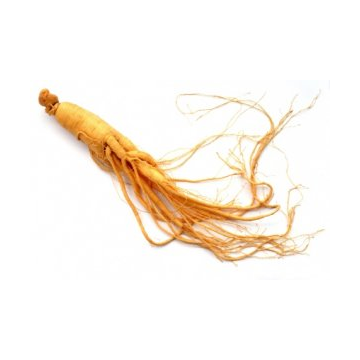FREE SHIPPING FROM 35 €
Search
Natural Ingredients
Ginseng
A tonic, energising, adaptogenic and anti-stress herb
Ginseng root is a general tonic, both physical and mental.
It possesses many properties, the main one is that it tackles states of physical and mental fatigue, and adaptogenic: adaptogenic is defined as a substance that is able to exert non-specific action on physiological processes with the result of increasing the physical resistance against environmental stress, increases overall efficiency in burdensome situations, being able to adapt the body to extraordinary burdens, both physical and mental conditions, and prevent the occurrence of diseases.
This ability has been verified in animal tests against various stress factors: resistance to cold, heat, chemical poisoning etc.
Ginseng therefore enhances the capacity of adaptation of the body and protects it against the unfavourable chemical-physical factors such as cold, heat.
It is able to stimulate the adrenal cortex and this is evidenced by the increase in urinary concentration in corticoids and the anti-inflammatory and antiessudative properties exercised by the plant.
The adaptogenic and balancing action of ginseng appears to be due to the hormone-structure of ginsenosides which constitute molecular skeletons particularly exploited by our body in order to synthesise hormones which are momentarily lacking.
From pharmacological tests it has been shown that this stimulating action is accompanied by an opposite sedative on the CNS (analgesic and anti-stress).
I nutraceutici
- 2-3% of triterpenoid saponins: ginsenosides (> ginsenosides Rgl, Rc, Rd, RID1, Rb0).
- 0.05% essential oil (gives Ginseng its typical smell): limonene, terpineol, citral, polyacetylenes.
- Amino acids and peptides
- Vitamins B1, B2, B12 and C, folic acid, nicotinic acid, biotin and pantothenic acid.
- Mineral substances and trace elements: magnesium, aluminium, phosphorus, calcium, vanadium, manganese, iron, cobalt, copper, germanium, and arsenic.
- Estrogenic compounds have been found in wild varieties.
It is used in many cosmetics for its revitalising and antioxidant effect on the skin.
The root has a shape where the head, the neck and ramifications, resemble a human figure. For this reason its name in Chinese means "little man".
Antiastenic, tonic, revitalising and convalescence.


